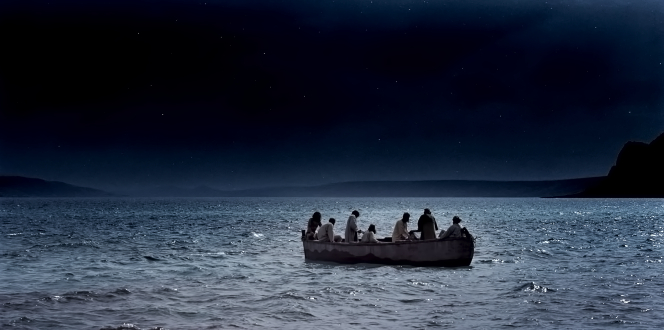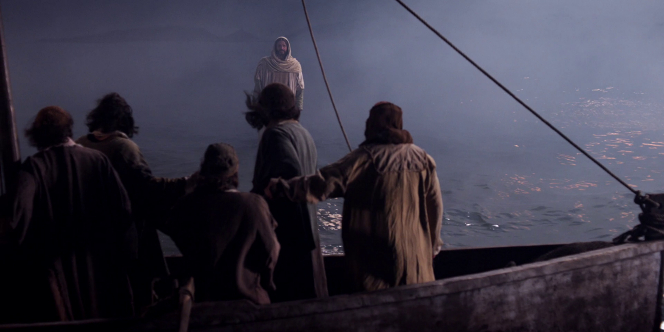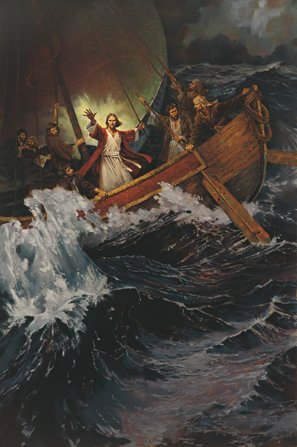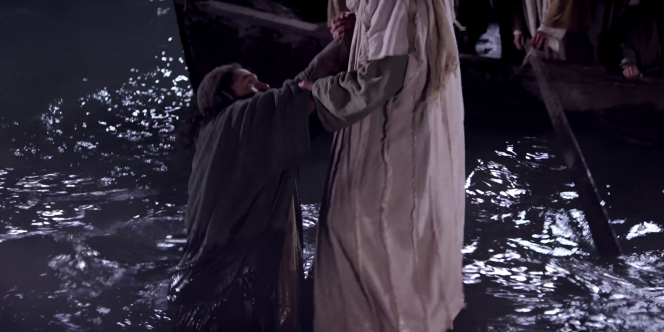As I have read this story over the years, question has repeatedly come to mind: on what grounds did the Savior call into question their lack of faith?
In the Bible Dictionary we read that "Faith is to hope for things which are not seen, but which are true, and must be centered in Jesus Christ in order to produce salvation." Doesn't that describe what occurred in this scene on the ship? The Apostles found themselves in the middle of an awful and dangerous storm so they turned to the Savior with hope that He could save them from their dangers. How can He then turn around and question their lack of faith?
As I have personally studied this principle of faith and worked to apply it in my life, I have learned a number of things that go beyond the simple definition stated above. It is certainly true that faith is a "hope for a better world" as based upon and founded in Jesus Christ. But this is not an exhaustive definition, this is only one aspect of faith.
In order to have real, substantial faith, our turning to Christ must be a reactive and instinctive choice rather than a safety net in case our own efforts fail to save us. Christ is not, indeed cannot be our backup, our plan B. As taught by multiple Book of Mormon prophets, "there is no other way or means whereby man can be saved, only in and through Christ. Behold, he is the life and the light of the world."
As we face the storms in our lives, our survival will not be determined on how much we have done for ourselves and how much time we have spent laboring, but instead how much we have allowed the Savior to work in our lives and to what extent we have allowed Him to be our saving grace.
I think this is the reason why Christ called into question the lack of faith of His Apostles--and why He has reason to call to question our lack of faith.
The scriptural account of this story tells us that "the waves beat into the ship so that it was now full." To me this line sheds a little light on some of the timing of these events. We can gather that the storm had been raging for some time before they awakened the Savior and sought His help. To that point I am confident that the others were scrambling all over the ship trying to do whatever they could to protect the ship and to protect their lives. But it wasn't until the ship was filled with water that they finally sought divine assistance from the Savior of the world. They had been too busy trying to save themselves from the storm that they left no room for true faith to be exercised, only desperation.
I want to emphasize that faith also does not mean turning to Christ when storms arise in our lives and, while kicking back in the shade saying, "You've got this, right?" True faith--the faith that will one day result in our exaltation--sees the storm approaching, immediately turns to the Savior, pleads for His help, and then works at His side to battle the storm.
I wish I could say that my response to the storms of life was different from these ancient Apostles. I wish I could say that at the first sign of trouble, my gut reaction was to get on my knees and pray "Heavenly Father, I see the signs of a tempest in my life. Please help me. Let's work together to overcome this." But sadly I don't. When such signs become evident in my life I batten down the hatches, gird my loins, and prepare for the ensuing choppy seas.
Then somewhere in the middle of the waves and the winds and the rain and the lightning I cry out in my frustration and fatigue, "Don't you care that I am sinking over here? Don't you care that this storm is about to take me under?" (Notice, another faithless aspect of such a prayer is an implicit nonchalant nature of God. Of course He care. Of course He wants to help. But He needs to wait until we ask for that help.)
It is at that point that I receive the chastising rebuke, "I would have been here at your side the whole time if you had only asked me." Humbled, I then begin to exercise my faith as I take a break from battling the storm to ask the Lord to help me. And then, with a less than surprising result, the storm instantly seems less fierce and the end of the storm suddenly comes into sight.
I know I am not the only one who acts this way in the face of trials. Many people I know also respond similarly to trails despite knowing, as I do, that there is a much easier and far better solution to fighting a storm than doing so on our own.
Why is that? Why do so many of us put self-confidence in where faith belongs, only to cry out and reach towards the Savior when we begin to sink?
I believe there is a myriad of answers to this question, each as unique and personal as the storms we face. Each of these answers, I believe, ties in to one simple statement: we don't turn to God immediately because we fail to remember His loving nature.
Sometimes we feel like He doesn't want to help us. Sometimes the thought is that the storm is a punishment for certain choices we have made and that the punishment also somehow includes God turning His back on us and forcing us to figure it out on our own. Other times we feel like we are awakening a sleeping God, or being a nuisance, or worrying about nothing, or that we just aren't worth the effort.
Every one of these thoughts is simply incorrect and is inspired by the being who wants to swallow you in the darkness of the storm as you give in to its power.
The truth of the matter is that God will help you. In the book of Moses we learn that the work and glory of God is "the immortality and eternal life of [mankind]." His entire purpose of existence revolves around you. He is, therefore, anxiously waiting to help you not only survive the tempests of life but to strengthen you in the process so that you come out stronger and better and closer to Him than you were before.
You may have made mistakes and brought upon yourself, by way of natural consequences, a storm. But that does not mean you have to fight it alone. Your Savior still loves you and wants to be at your side as you struggle through the storm. However, out of respect for you and your personal growth, He remains in the background as a supporting cast member until you call Him forward. At that time He commands both the storm and you, "Peace, be still."
 As we make a concerted effort to call upon the strength and help of the Lord at the outset of the storms we face, we save the effort and energy we would have spent fighting it on our own, we strengthen our relationship with Christ as we find ourselves spending more time at His side battling the storm, and we learn to become more like Him.
As we make a concerted effort to call upon the strength and help of the Lord at the outset of the storms we face, we save the effort and energy we would have spent fighting it on our own, we strengthen our relationship with Christ as we find ourselves spending more time at His side battling the storm, and we learn to become more like Him.This principle is outlined in many stories in the scriptures, particularly in the Book of Mormon. One story in particular depicts the differences between acting out of faith versus acting out of desperation. In the book of Mosiah in the Book of Mormon, we find two groups who had split off from one another, each suffering persecution from their enemies.
The first group, led by their king, Limhi, find themselves in difficult circumstances and try to fight their way out. After three failed attempts to battle their captors, they finally humble themselves to the point of calling on God to help. "And they did humble themselves even in the depths of humility; and they did cry mightily to God; yea, even all the day long did they cry unto their God that he would deliver them out of their afflictions. And now the Lord was slow to hear their cry because of their iniquities; nevertheless the Lord did hear their cries, and . . . began to ease their burdens".
Now compare them with the second group, led by the prophet Alma. After we read of the difficult circumstances they find themselves in and the hatred of their captors, the very next verse states, "And it came to pass that so great were their afflictions that they began to cry mightily to God." Rather than waiting until their efforts proved fruitless, this group immediately prayed for the Lord's help. Then, after their captors threatened to kill anyone caught praying, "Alma and his people did not raise their voices to the Lord their God, but did pour out their hearts to him; and he did know the thoughts of their hearts." That is true faith.
Even in the face of death, the people of Alma continued to exercise their faith and call upon the blessings and assistance of God. "And it came to pass that the voice of the Lord came to them in their afflictions, saying: Lift up your heads and be of good comfort, for I . . . will covenant with my people and deliver them out of bondage. And I will also ease the burdens which are put upon your shoulders, that even you cannot feel them upon your backs".
The Lord blessed both of these groups. They both escaped the dangers that encompassed them. However the people of Limhi did so after great efforts and struggles with the faith of "no other choice". The people of Alma immediately turned to God, heard His voice, quickly had their burdens lifted so much that they couldn't recognize them, and were led out of bondage directly by the hand of the Lord. God blessed both of these groups, but He presence was much stronger with the group that exercised true faith.
I love the way Brad Wilcox explains this principle as he explains the cooperative nature of the grace of Christ. He says, "When we do finally pass through the veil that separates us and the celestial kingdom, it will not be as individuals who have done our parts. It will be holding hands with Jesus. On that sacred day there will be no He and I--only we."
 In order for this to become a reality--which I believe is what Christ truly wants for us--we must make a habit of working with the Savior during our life on earth. We cannot spend our lives turning to Him in an act of desperation after all of our efforts have failed to stop our ship from sinking and then expect in the next life to feel comfortable being alongside the Savior. Working with Him must become a habit here and now by exercising our faith and immediately turning to Him when the storms arise.
In order for this to become a reality--which I believe is what Christ truly wants for us--we must make a habit of working with the Savior during our life on earth. We cannot spend our lives turning to Him in an act of desperation after all of our efforts have failed to stop our ship from sinking and then expect in the next life to feel comfortable being alongside the Savior. Working with Him must become a habit here and now by exercising our faith and immediately turning to Him when the storms arise.Sometimes He will calm the storm. Sometimes He will calm us. And sometimes He will grab a bucket and help bail the water from the ship. Regardless of how He does it, one thing will always be true: as often as we call for help, Christ, our Savior and Redeemer, will run to our side to be our aide.


No comments:
Post a Comment